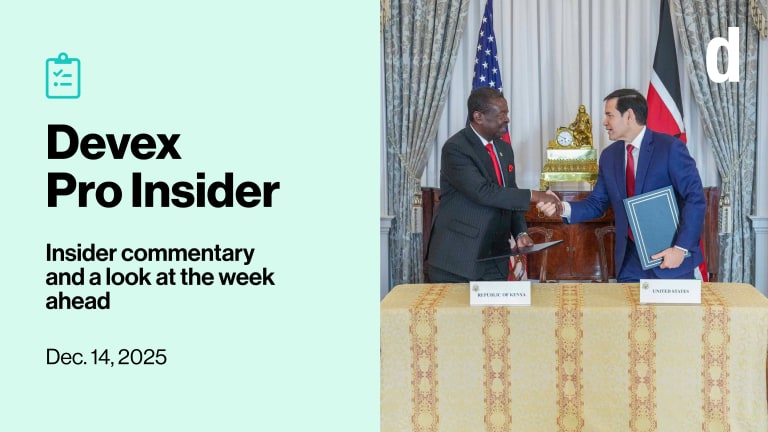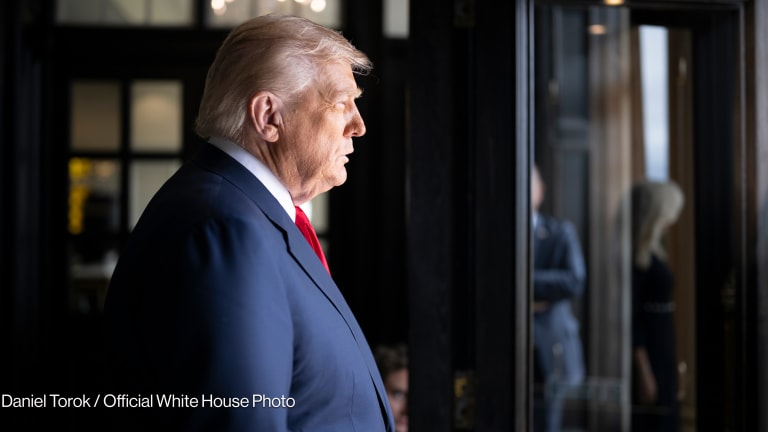Devex Pro Insider: Peace Corps shuffle, watered-down abuses, and a $3M prize
The Peace Corps shuffles leadership team to advance Trump administration foreign aid priorities; and the Hilton Humanitarian Prize increases its unrestricted funding award.
President Donald Trump’s “America First” guiding ethos and the Department of Government Efficiency’s cost-cutting crusade have seeped into nearly every nook and cranny of the U.S. government, in particular its once-sprawling foreign aid apparatus. Unless you’ve been living under a rock under the permafrost of Antarctica, you’ll know that one of the most seismic changes has been the extinction of the U.S. Agency for International Development, whose surviving parts are being absorbed by a slimmed-down, restructured State Department. Another potentially tectonic shift could be happening at the Peace Corps, whose CEO, deputy CEO, and acting chief of staff all resigned last week “to pave the way for a new leadership team to step in and guide the organizational transformations that will make Peace Corps stronger and more efficient in the long run,” according to a statement. There’s that loaded word — efficient. DOGE, in fact, paid multiple visits to Peace Corps headquarters, leading to speculation that it would suffer the same fate as USAID. But that hasn’t happened, and it remains to be seen what a new slate of leaders will do to the iconic American agency. One person my colleague Michael Igoe spoke to for his article suggested that Peace Corps programs in countries that don’t pass the “America First” loyalty test could be on the chopping block — a plausible theory given the administration’s transactional approach to foreign policy. That approach played out in real time last week when the State Department released its annual human rights report, which critics say watered down abuses in Trump-friendly authoritarian states such as El Salvador, while playing up supposed transgressions by foes such as South Africa. The State Department said the global assessment was “streamlined” to hew closer to law; others say it was a politicized rump of its former self. “These reports are required by law to ensure American taxpayer dollars do not support human rights abusers,” said Sen. Jeanne Shaheen, a Democrat from New Hampshire, in a statement. “The erasure of entire sections focused on discrimination and attacks against vulnerable groups, government corruption, due process, and other civil and political rights is a betrayal of American values and brave human rights defenders around the world.” Also in today’s edition: An aid group lands a coveted and lucrative prize; a major leap in malaria prevention; and Africa may be on the map, but not the way it wants to be. Bits and pieces Look in the mirror. Whether flawed or not, the State Department is fond of ranking countries based on certain criteria and values. But how does the U.S. itself measure up? Not that well, according to the nonprofit group Civicus, which placed it on a watch list following “sustained attacks on civic freedoms” across the country. “Peaceful protests are confronted with military force, critics are treated as criminals, journalists are targeted, and support for civil society and international cooperation have been cut back,” Mandeep Tiwana, Civicus’s secretary-general, said in a statement. “Six months into Donald Trump’s second term, a bizarre assault on fundamental freedoms and constitutional safeguards has become the new normal.” Hefty prize gets heftier. Since 1996, the Hilton Humanitarian Prize has awarded a whopping $46.5 million to 29 nonprofits working in some of the world’s most challenging environments. To mark the prize’s 30th anniversary, its unrestricted funding award will increase from $2.5 million to $3 million this year. So who’s this year’s lucky recipient? The Mines Advisory Group, which specializes in landmine removal and armed violence reduction in communities affected by conflict. “Our hope is that this spotlight can help underscore the fundamental human right to live free from the fear of landmines and armed violence,” said Darren Cormack, CEO of the Mines Advisory Group. “Every landmine cleared is a life saved, a community restored and a future reclaimed.” Size matters. Africa is an enormous continent, but do maps do the landmass justice? No, according to the African Union, which is backing a campaign to end the use by governments and international organizations of the widely used 16th-century map created by Gerardus Mercator because it shortchanges Africa's size. "It might seem to be just a map, but in reality, it is not," Selma Malika Haddadi, AU Commission deputy chair, told Reuters, adding that the Mercator map fostered a false impression that Africa was “marginal” — reinforcing stereotypes. Repelling a killer. Zapping mosquitoes in wealthy countries such as the U.S. is usually more a matter of convenience to avoid pesky bug bites. In the global south, it can be a matter of life or death, as mosquitoes spread a host of diseases, including a particularly stubborn killer: malaria. But there’s a new (well, not-so-new) weapon in fighting malaria: spatial emanators. Also known as spatial repellents, these zappers emit ingredients into the air to kill mosquitoes, deter them from entering treated spaces, and prevent them from locating and biting humans, according to the World Health Organization, which just issued a long-awaited recommendation to use them. “This recommendation opens the door to a new intervention for national malaria control programmes at a time when innovation is urgently needed,” said Dr. Daniel Ngamije, WHO’s director of malaria and neglected tropical diseases. WHO has also prequalified two spatial emanators products, Mosquito Shield and Guardian, manufactured by SC Johnson. “This important milestone comes after more than 10 years of SC Johnson efforts and more than $100 million invested in the development, testing, production and deployment of our spatial repellent products,” said Fisk Johnson, chair and CEO of SC Johnson, in a statement. "From day one, this has been a not-for-profit initiative driven by our commitment to combat diseases that threaten hundreds of millions of people." Honing in on abortion. Earlier this summer, the Lancet medical journal came out with a stunning statistic that Trump’s aid cuts could result in more than 14 million additional deaths by 2030. The study was widely cited around the world. Now, to mark World Humanitarian Day on Aug. 19, another study conducted in Uganda and Kenya honed in on a more niche topic: abortion practices in two refugee camps. “Refugees in these two contexts have little access to WHO-recommended methods of abortion, and the need for safe abortion services is high,” the study revealed, declaring that “access to abortion is a fundamental human right” and noting the lack of data on abortion experiences among those living in displacement. Gaza mobilization. The newly formed UN Staff for Gaza, a private association not formally affiliated with or endorsed by the United Nations, will “mobilize on 19 August 2025 at United Nations Headquarters, on the occasion of World Humanitarian Day, to pay tribute to the 346 members of UN personnel killed in Gaza since 7 October 2023, as well the other 162 humanitarians killed while in service of humanity, and show solidarity with our colleagues on the ground,” according to the organization. Andrew Gilmour, former U.N. assistant secretary-general for human rights, will serve as chair of the new association. “My former colleagues in the West Bank and Gaza have endured unimaginable suffering as they have been impeded from doing their life-saving UN-mandated tasks,” he wrote on LinkedIn. “In the UN's 80-year history, no other government has killed - in their homes and while they work - anything like as many UN civilian staff.” Reporting the obvious. As a newsroom, headlines are a constant battle. They must be accurate yet compelling, catchy, and to the point. It’s not as easy as people think. Reuters recently had an enviable one land in its lap: “UN report finds United Nations reports are not widely read.” Needless to say, the headline doesn’t require much explanation, which means it served its purpose. Moving on Tammy Bruce, spokesperson for the State Department, has been nominated by Trump to serve as U.S. deputy representative to the United Nations. A former Fox News host, she is the author of “Fear Itself: Exposing the Left's Mind-Killing Agenda.” She will need Senate confirmation to assume the role. Aleksander Dardeli has left his position as chief operating officer of Save the Children US. “The past few months have brought tough decisions — cutting programs and saying goodbye to valued colleagues — but they’ve also shown our ability to learn from one another and weather storms together,” he wrote on LinkedIn. Liam Kelly is starting a new position as head of office for DG ECHO at the European Commission. DG ECHO began as the European Union’s humanitarian aid office and has been providing humanitarian assistance for over 30 years. Carol Koech has been appointed vice president for Africa at the Global Energy Alliance for People and Planet, where she will lead GEAPP’s Africa strategy, focused on scaling energy access through Mission 300 — supporting just and inclusive green growth. Anastasia Marceau joins the Clean Air Task Force as managing director. Marceau brings more than 25 years of strategic and operational leadership experience, most recently as managing director at Accenture, where she led the climate and environment impact practice. Habtamu Molla Ayele is starting a new position as African epidemic service epidemiologist at the Africa Centres for Disease Control and Prevention. Oge Onubogu has been named senior fellow and director of the Africa program at the Center for Strategic and International Studies. Onubogu recently served as director of the Africa program at the Wilson Center and, before that, was the director of the West Africa program at the U.S. Institute of Peace. Rachel Peniston is joining the Foreign Policy for America's NextGen Initiative, a community of more than 400 emerging leaders committed to advancing principled U.S. foreign policy and diplomacy. Carolina Rendón has been appointed as the World Bank’s resident representative for the Dominican Republic. She succeeds Alexandria Valerio, who held the position for the past five years. Brad Smith, a former official at DOGE, is returning to the Trump administration to focus on global health at the State Department, according to Semafor, which noted he will lead and design the department’s strategy on the issue. Tsutomu Yamamoto has been appointed by the World Bank as managing director of the Multilateral Investment Guarantee Agency, or MIGA, home of the World Bank Group Guarantee Platform. Yamamoto, a Japanese national, will join the agency from Mizuho Financial Group, where he is a senior managing executive officer and head of the Global Transaction Banking Unit. “Tsutomu Yamamoto has more than 30 years of experience in banking and finance at Mizuho,” said World Bank President Ajay Banga. “Given the crucial role guarantees have to play in mobilizing the private sector to create jobs, his expertise will be invaluable for growing our guarantee business.” Coming up Behind the scenes: How Finnfund deploys technical support. What does technical assistance look like when it’s not about grants — but still central to how a development finance institution supports its investments? In this 30-minute Devex Pro Funding Briefing, Juho Uusihakala, senior development impact adviser at Finnfund, will offer a behind-the-scenes look at how the Finnish DFI provides technical support to its investees. It will offer practical insights into how one DFI is translating donor-backed guarantees into targeted support — and what that means for potential partners. Aug. 19 at 9:30 a.m. ET. Lessons from the first billion-dollar trust-based philanthropy initiative. Long before “trust-based philanthropy” became a buzzword, the Ford Foundation launched BUILD — a bold, multiyear, $2 billion initiative to strengthen civil society institutions through long-term, flexible support. Nearly a decade in, BUILD has reached over 500 partners in 44 countries and become a blueprint for funders and organizations seeking to center resilience and sustainability in their funding models. In this live Devex Pro Funding conversation, we’ll be joined by Victoria Dunning, director of the BUILD initiative, to explore: • How Ford defines and measures success when investing in institutions, not just programs. • What BUILD has learned from nearly a decade of implementation across diverse regions. • What advice grantee organizations — and other funders — can draw from the model. Aug. 20 at 9:30 a.m. ET. From deals to systems: Insights from FMO’s updated strategy. As global development players rethink how to mobilize private capital, development finance institutions are stepping up not just as investors — but as market creators. In this Devex Pro Live conversation, we’ll speak with Andrew Shaw, impact manager at FMO, about how the Dutch development bank is evolving its role in the ecosystem. We’ll also reflect on the Financing for Development summit held in Sevilla, Spain, last month — and what its outcomes signal for development finance institutions, funders, and implementing partners moving forward. Aug. 21 at 9:30 a.m. ET. Job of the week Your Devex Pro membership includes access to the world’s largest global development job board. Here’s the latest opportunity: • Kenya Country Director, CARE. Search for more opportunities now.
President Donald Trump’s “America First” guiding ethos and the Department of Government Efficiency’s cost-cutting crusade have seeped into nearly every nook and cranny of the U.S. government, in particular its once-sprawling foreign aid apparatus.
Unless you’ve been living under a rock under the permafrost of Antarctica, you’ll know that one of the most seismic changes has been the extinction of the U.S. Agency for International Development, whose surviving parts are being absorbed by a slimmed-down, restructured State Department.
Another potentially tectonic shift could be happening at the Peace Corps, whose CEO, deputy CEO, and acting chief of staff all resigned last week “to pave the way for a new leadership team to step in and guide the organizational transformations that will make Peace Corps stronger and more efficient in the long run,” according to a statement.
This story is forDevex Promembers
Unlock this story now with a 15-day free trial of Devex Pro.
With a Devex Pro subscription you'll get access to deeper analysis and exclusive insights from our reporters and analysts.
Start my free trialRequest a group subscription Printing articles to share with others is a breach of our terms and conditions and copyright policy. Please use the sharing options on the left side of the article. Devex Pro members may share up to 10 articles per month using the Pro share tool ( ).
Anna Gawel is the Managing Editor of Devex. She previously worked as the managing editor of The Washington Diplomat, the flagship publication of D.C.’s diplomatic community. She’s had hundreds of articles published on world affairs, U.S. foreign policy, politics, security, trade, travel and the arts on topics ranging from the impact of State Department budget cuts to Caribbean efforts to fight climate change. She was also a broadcast producer and digital editor at WTOP News and host of the Global 360 podcast. She holds a journalism degree from the University of Maryland in College Park.








